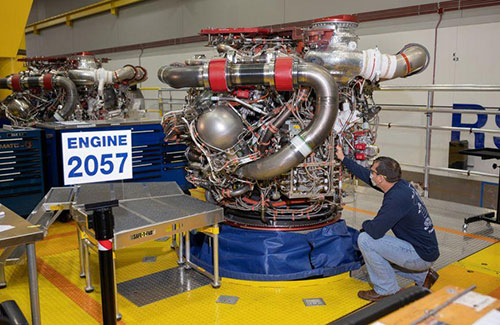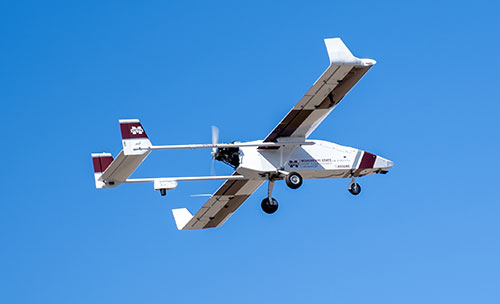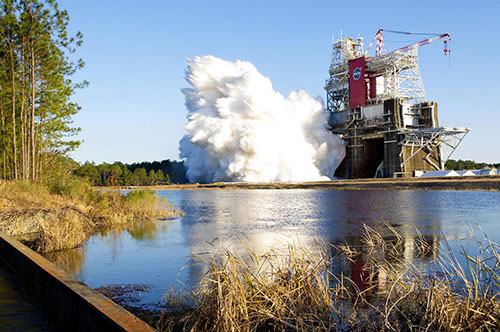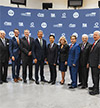Anchored by NASA’s Stennis Space Center, the Mississippi Gulf Coast Aerospace Corridor is one of the fastest-growing aerospace clusters in the U.S. This region provides unique assets and competitive advantages for aviation and defense companies due to the concentration of existing aerospace companies and supporting resources. With the many testing facilities and research institutions in the corridor, rocket engines ranging from the Apollo program in the 1960s to the most recent Artemis launch have been tested here. In addition to NASA, a number of leading private-sector aerospace companies have facilities here and benefit from the collaborative spirit within the corridor. For example, recent announcements and accomplishments include the following:
- Solid rocket fuel innovator Adranos (which has recently been acquired by defense contractor Anduril) is expanding its rocket R&D and testing operations in McHenry. The $1.35 million project will create 25 new jobs. The company’s proximity to Stennis Space Center “provides us access to first-class facilities and an exceptional talent base to enable the growth of our rocket motor research, development, and production operations for years to come,” says Adranos CEO Chris Stoker.
- U.S.-based Rocket Lab is building an engine test facility for its new Neutron rocket at NASA’s Stennis Space Center. Rocket Lab is the launcher of Electron, the second most frequently flown U.S. rocket. Since 2018, Electron has taken 150 satellites into orbit for civil, defense, and commercial customers. Rocket Lab is now developing Neutron, a much larger, reusable rocket intended for national security missions and deploying multiple satellites.
- Aerojet Rocketdyne played a key role in the successful launch of NASA’s super-heavy-lift Space Launch System (SLS) for the Artemis program. The company provided 39 propulsive elements for the highly successful Artemis I mission. These components were part of the SLS rocket and the uncrewed Orion spacecraft, including the first-stage and second-stage engines.

Mississippi has one of the greatest concentrations of aerospace and defense personnel in the country. For example, the FAA has designated Mississippi State University (MSU) as its Center of Excellence for Unmanned Aircraft Systems, also known as ASSURE. The University of Mississippi (UM) is a national leader in the rapidly growing field of aero-acoustics. UM’s National Center for Physical Acoustics partners with industry to design, develop, and test advanced aircraft components and sensors for use in the aerospace industry, as well as to find new ways to reduce noise levels in aircraft.
Mississippi has one of the greatest concentrations of aerospace and defense personnel in the country. Mississippi delivers customized aerospace training through its strong community college system and workforce development resources. Specialized training is offered at community colleges throughout Southeast Mississippi; specialties include electronics, welding, precision manufacturing, machining, aviation structures, instrumentation and control technology, and unmanned aerial systems. Mississippi Gulf Coast Community College has also partnered with MSU to offer a four-year engineering degree program to support the aerospace and defense sector within the corridor.
“We have had great support from the state and have been working closely with East Mississippi Community College and MSU and its Advanced Composite Institute on workforce development and training,” says Luke Colville, vice president of aero systems at Aurora Flight Sciences, which operates an aerospace composite and advanced materials production center in Columbus, Mississippi. “STEM support is also increasing in K-12 education, which is very positive for the overall aerospace and engineering community in Mississippi,” says Colville.

Aerospace is booming in Mississippi, especially the testing and production of next-generation propulsion technologies, which are supported by a strong and collaborative ecosystem of academia, government, and industry.
Pro-active government support continues to help advance this vital industry cluster. For example, the Aerospace Initiative Incentives Program provides enhanced tax incentives for aerospace-related businesses that locate or expand in the state. Companies may qualify for a 10-year state income tax exemption, a 10-year franchise tax exemption, and an exemption from sales and use tax during start-up if they create 25 jobs that pay 110 percent of the state average wage and make a $25 million investment.
“We moved to Mississippi for three reasons,” says Michael Grasso, executive vice president of business operations for Adranos. “First, Mississippi gives us access to specialized infrastructure. Second is the availability of talent. And third is the startup support from the state. Moving to Mississippi has been a boon to our business” — so much so that Adranos plans to scale up its workforce and invest in its facilities to expand its motor production capacity.
The Aerospace Initiative Incentives Program provides enhanced tax incentives for aerospace-related businesses that locate or expand in the state. Rocket Lab is also expanding its R&D efforts at its Archimedes Test Complex at Stennis Space Center, where it will use existing NASA infrastructure to test its Neutron rocket, which is currently in development. Neutron will be a 141-foot-tall launch vehicle capable of carrying 13,000 kilograms to space. Neutron will be powered by the new Archimedes engine, a 165,000 lbf liquid oxygen/liquid methane rocket engine designed for reliable re-use.
“Stennis’ strength is in its rocket engine testing legacy, established and large-scale testing infrastructure, and skilled workforce,” says Andy Bunker vice president of government operations and business strategy. “We’re targeting Neutron’s first launch in 2024, and that aggressive timeline is being supported by Mississippi’s and Stennis’ willingness and capability to move as fast as we do.”
“Mississippi makes things incredibly easy, especially for businesses in aerospace and defense,” adds Grasso. “The availability of specialized infrastructure, talent, and outstanding academic institutions provides many of the critical ingredients we need for long-term success in Mississippi.”




